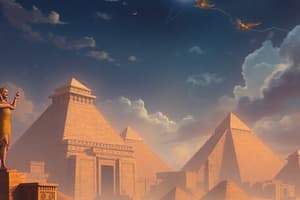Podcast
Questions and Answers
Which ancient civilization is known for developing the cuneiform writing system?
Which ancient civilization is known for developing the cuneiform writing system?
- Persians
- Sumerians (correct)
- Babylonians
- Egyptians
What type of structure did the Sumerians build at the top of their large stepped pyramids?
What type of structure did the Sumerians build at the top of their large stepped pyramids?
- Granaries
- Temples (correct)
- Tombs
- Palaces
Which Mesopotamian king is famous for his code of laws written on stone tablets?
Which Mesopotamian king is famous for his code of laws written on stone tablets?
- King Cyrus
- King Hammurabi (correct)
- King Sargon
- King Narmer
When did the ancient Egyptian civilization end?
When did the ancient Egyptian civilization end?
Which of the following is NOT considered an ancient civilization?
Which of the following is NOT considered an ancient civilization?
Which ancient civilization is known for its significant cultural achievements that continue to influence modern society?
Which ancient civilization is known for its significant cultural achievements that continue to influence modern society?
Which ancient civilization developed from approximately 1200 to 1533 CE in South America?
Which ancient civilization developed from approximately 1200 to 1533 CE in South America?
What significant architectural structures did both the Mayans and Incas leave behind?
What significant architectural structures did both the Mayans and Incas leave behind?
When did Greek civilization flourish?
When did Greek civilization flourish?
Which ancient society is known for its engineering marvels like aqueducts and roads?
Which ancient society is known for its engineering marvels like aqueducts and roads?
What purpose did hieroglyphics serve in ancient Egyptian society?
What purpose did hieroglyphics serve in ancient Egyptian society?
Which ancient civilization left behind codices, hieroglyphics, and calendars?
Which ancient civilization left behind codices, hieroglyphics, and calendars?
Flashcards are hidden until you start studying
Study Notes
Ancient Civilizations
Ancient civilizations refer to complex human societies from various periods in history, most of which were established before the fall of the western Roman Empire in 476 AD. These societies left behind significant cultural achievements that continue to influence modern society. Some notable examples include the Sumerians, Babylonians, Egyptians, Greeks, Romans, Mayans, Inca, Chinese, Japanese, Indians, Persians, Celts, Etruscans, Carthaginians, and Scythians. Each civilization has its own unique characteristics, culture, and accomplishments.
Mesopotamia
Mesopotamia's earliest civilization was likely the Sumerians who founded cities like Ur, Uruk, Eridu, and Lagash along the southern alluvial plain by 5000 BCE. They developed the cuneiform writing system and built ziggurats, large stepped pyramids with temples at their top. Despite being conquered several times throughout history, these city-states remained independent, each ruled by its own king.
The Babylonians adopted much of the Sumerian culture but worshipped different gods. King Hammurabi is famous for his code of laws carved into stone tablets around 2800 BCE. The Akkadians later replaced the Sumerians under King Sargon, introducing new writing techniques and governance systems.
Egypt
Egypt's civilization emerged around 3100 BCE when Upper and Lower Egypt were united by King Narmer. It lasted until the conquest of Alexander the Great in 332 BCE. The Pyramids of Giza and the Great Sphinx are among Egypt's most renowned landmarks. Ancient Egyptian society was based on a hierarchical system of rulers, nobles, priests, soldiers, merchants, artisans, and slaves. Hieroglyphics served both religious and administrative purposes during this time.
Greece
The ancient Greeks' civilization flourished between 800 BCE and 338 BCE. They made significant advances in art, philosophy, drama, politics, and mathematics, shaping Western thought. Greek city-states like Sparta and Athens held cultural festivals and competitions, such as the Olympic Games and the Pythian Games. By around 800 BCE, Greek colonies had established themselves along the Black Sea and southern Italy.
Rome
Rome's origins trace back to Romulus and Remus, twin brothers who founded the city in 753 BCE. Over centuries, Rome grew into a powerful empire known for its engineering marvels like aqueducts and roads, affecting Western civilization more than any other society before or since.
Mayans & Incas
Mayan civilization developed from the preclassic period (2000 BCE to 600 CE) to the postclassic period (900 to 1200 CE) in present-day Mexico, Guatemala, Belize, and Honduras. Inca civilization flourished from approximately 1200 to 1533 CE in South America. Both societies left behind impressive architecture, including pyramids, temples, palaces, and plazas. The Maya are also renowned for their codices, hieroglyphics, and calendars.
These ancient civilizations represent only a fraction of the rich history humans have created over thousands of years. Each culture's achievements continue to inspire modern innovations and global connections. Empathizing with their stories helps us better understand ourselves and our shared human experiences.
Studying That Suits You
Use AI to generate personalized quizzes and flashcards to suit your learning preferences.



